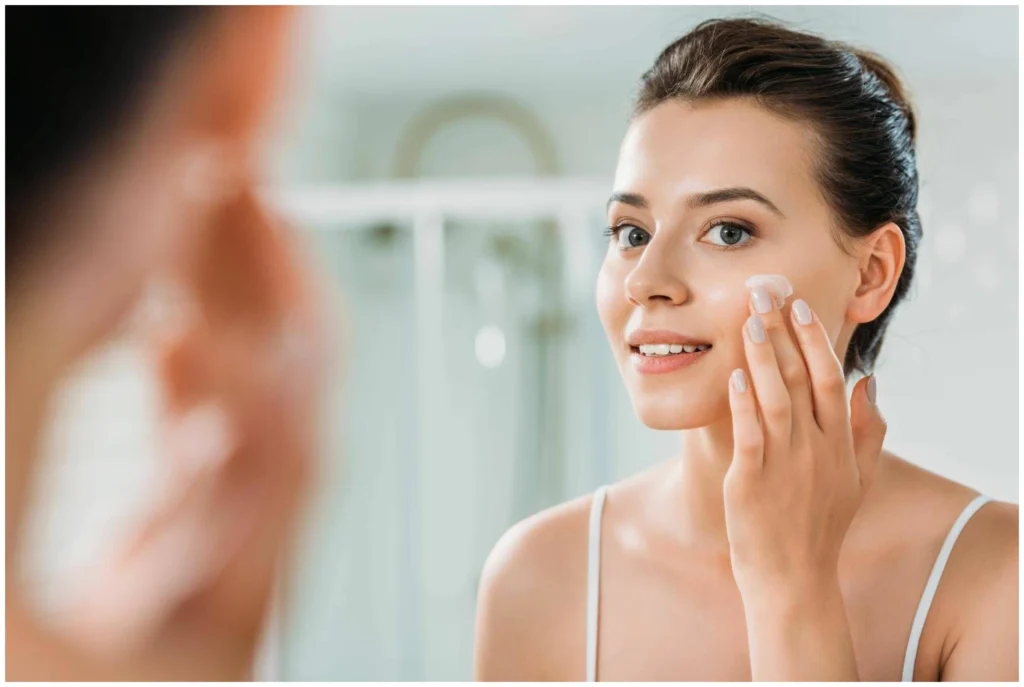Having clear and healthy skin is a goal many people strive for, but with the number of skincare products and routines available today, it can often feel overwhelming. In fact, skin problems such as acne, dryness, dullness, and wrinkles are common challenges that many face.
However, clear skin is achievable, and with the right approach, you can achieve healthy, radiant skin that shines from the inside out.
In this guide, we’ll explore 7 proven strategies for achieving clear skin and maintaining a healthy complexion over time. These strategies combine skincare, nutrition, lifestyle changes, and expert advice to help you achieve the clear, glowing skin you’ve always dreamed of.
1. Establish a Consistent Skincare Routine
A consistent skincare routine is essential for clear and healthy skin. The key to maintaining great skin lies in choosing the right products for your skin type and using them regularly.
Building a Basic Skincare Routine:
- Cleansing: Cleansing is the first step in any skincare routine. It removes dirt, oil, and impurities that build up throughout the day. Use a gentle cleanser suited to your skin type whether that’s oily, dry, combination, or sensitive. Choose one that cleanses effectively without stripping your skin of natural moisture.
- Toning: After cleansing, apply a toner to balance your skin’s pH and prepare it for the next steps. Look for toners with witch hazel, rose water, or aloe vera to calm the skin and shrink pores.
- Moisturizing: A moisturizer is crucial for maintaining skin hydration. Even oily skin needs and moisture to prevent overproduction of sebum, which can lead to breakouts. Choose a non comedogenic moisturizer that won’t clog pores.
- Exfoliating: Exfoliation helps to remove dead skin cells that can cause your skin to appear dull. Use an exfoliant with alpha hydroxy acids (AHAs) or beta hydroxy acids (BHAs) to gently slough off dead skin. However, don’t over exfoliate twice a week is usually sufficient.
Important Skincare Tips:
- Always remove makeup before bed to prevent clogged pores.
- Make sure to wear sunscreen daily to protect your skin from UV damage, which can accelerate aging and cause skin damage.
- Adapt your routine according to the season. In the colder months, you may need more hydrating products, while in summer, you might want products focused on oil control.
2. Hydrate from Within
Hydration is essential for clear skin. Dehydrated skin is more prone to irritations, fine lines, and dullness. While moisturizing your skin topically is important, the best place to start is from within.
Drinking Water for Skin Health:
Drinking plenty of water ensures that your skin remains hydrated and healthy. Aim to drink at least 8-10 glasses of water each day to flush out toxins and keep your skin cells hydrated.
Hydration Rich Foods for Clear Skin:
In addition to drinking water, eating foods high in water content can boost your skin’s hydration:
- Cucumbers, watermelons, and celery are packed with water and will keep your skin refreshed.
- Avocados and olive oil provide healthy fats that help lock in moisture and prevent dry skin.
- Coconut water is also an excellent hydrating option that can refresh and nourish your skin from the inside out.
How Hydration Improves Skin:
When your skin is well hydrated, it functions optimally, resulting in a more plump and smooth appearance. It can also help reduce the appearance of fine lines and make your complexion look more youthful and radiant.
3. Adopt a Skin Friendly Diet
What you eat has a direct impact on the health and appearance of your skin. A skin friendly diet that’s rich in vitamins, minerals, and antioxidants can help prevent breakouts, reduce inflammation, and promote a glowing complexion.
Key Nutrients for Healthy Skin:
- Vitamin C: Found in foods like oranges, berries, and bell peppers, vitamin C is an antioxidant that helps brighten skin and reduce pigmentation.
- Zinc: Zinc helps regulate oil production and has anti inflammatory properties, which can be beneficial for acne prone skin. Foods like pumpkin seeds, chickpeas, and spinach are rich in zinc.
- Omega-3 Fatty Acids: Omega-3s, found in foods like salmon, walnuts, and chia seeds, help reduce inflammation and keep your skin hydrated.
- Antioxidant Rich Foods: Include green leafy vegetables, tomatoes, and nuts to combat free radicals, which can cause premature skin aging and damage.
Foods to Avoid for Clear Skin:
- Sugar: Excessive sugar intake can lead to breakouts and contribute to inflammation. Consider cutting back on sugary drinks, processed snacks, and sweets.
- Dairy: Some studies suggest that dairy products may contribute to acne in certain individuals. Try reducing dairy and observe how your skin reacts.
- Processed Foods: Highly processed foods that are rich in trans fats and refined carbs can lead to increased oil production, which may clog your pores.
4. Get Enough Sleep for Skin Regeneration
Sleep plays a crucial role in skin health. During sleep, your body works to repair itself, including regenerating skin cells. Lack of sleep can lead to a dull complexion, fine lines, and even dark circles under your eyes.
How Sleep Affects Your Skin:
- Cell Regeneration: Your skin repairs itself while you sleep, making this an important time for cell turnover and collagen production.
- Reduced Stress: Sleep also helps reduce stress, which can otherwise trigger breakouts and other skin issues.
- Dark Circles and Puffiness: Sleep deprivation can cause dark circles and under eye puffiness, making your skin look tired and aged.
How Much Sleep Do You Need?
Most adults need 7-9 hours of quality sleep per night. Establish a relaxing bedtime routine and avoid looking at screens for at least an hour before bed. A good night’s sleep helps your skin maintain its radiance and youthful appearance.
5. Exercise Regularly for Healthier Skin
Exercise is not just great for your overall health it’s also fantastic for your skin. Physical activity increases blood circulation, which helps deliver more oxygen and nutrients to your skin.
How Exercise Improves Skin Health:
- Increased Blood Flow: Exercise boosts circulation, which helps deliver nutrients to skin cells, promoting a healthy glow.
- Detoxification: Sweating during exercise helps flush out toxins and clean your pores, preventing clogged pores that can lead to breakouts.
- Stress Reduction: Exercise is an excellent way to reduce stress, which can contribute to acne and other skin issues.
Exercise Tips for Healthy Skin:
- Engage in moderate exercise for at least 30 minutes a day. Whether it’s yoga, jogging, or a high intensity workout, make exercise a consistent part of your routine.
- Don’t forget to cleanse your skin after exercising to remove sweat and prevent clogged pores.
6. Manage Stress for Clearer Skin
Chronic stress can wreak havoc on your skin. It triggers the release of cortisol, a hormone that can increase oil production, leading to acne and other skin issues.
The Impact of Stress on Skin:
- Acne: Increased cortisol levels can cause the sebaceous glands to produce more oil, which can lead to clogged pores and breakouts.
- Inflammation: Stress can cause inflammation, which can make existing skin conditions like eczema or rosacea worse.
- Premature Aging: Chronic stress accelerates the aging process by breaking down collagen and elastin, leading to fine lines and wrinkles.
Stress Reduction Techniques:
- Mindfulness and meditation can help reduce stress and improve skin health.
- Breathing exercises and taking regular breaks can also lower stress levels.
- Hobbies and relaxation techniques are important for maintaining emotional well being and preventing skin flare ups.
7. Professional Treatments and Regular Skin Check ups
While at home skincare routines are essential, there’s no substitute for professional treatments and regular check ups with a dermatologist. Certain skin concerns may require advanced treatments that can take your skincare routine to the next level.
Popular Professional Treatments for Clear Skin:
- Chemical Peels: These treatments exfoliate the skin, remove dead cells, and promote collagen production. They can improve skin texture, reduce pigmentation, and clear acne.
- Microneedling: A procedure that uses tiny needles to create micro injuries in the skin, stimulating collagen production and improving skin texture.
- Laser Treatments: These treatments target specific skin issues like hyperpigmentation, acne scars, or wrinkles, providing long lasting improvements.
- Facials: Regular facials at a spa or dermatologist’s office can help cleanse your skin, remove impurities, and promote a healthy glow.
Regular Skin Check ups:
It’s important to visit a dermatologist regularly to keep your skin healthy and clear and to catch any potential issues early. A dermatologist can help you create a tailored skincare routine and address any concerns that require professional care.
Conclusion: Your Path to Clear and Healthy Skin
Achieving clear and healthy skin requires more than just using the right products it’s about adopting a holistic approach that combines the best skincare practices, a healthy diet, regular exercise, and stress management.
By following these seven proven strategies, you can enjoy radiant skin that feels as good as it looks.
Remember, consistency is key. Your skin won’t change overnight, but with patience and dedication, you will see noticeable improvements in its appearance, texture, and overall health. Start today and embrace the path to clearer, healthier skin!
FAQs
- How long will it take to see results from following a skincare routine?
It usually takes 4 to 6 weeks to see visible improvements in your skin when following a consistent skincare routine. Your skin needs time to repair and regenerate, so be patient and stay committed to your routine. - Can drinking water really improve my skin?
Yes, staying hydrated by drinking enough water helps keep your skin plump and moisturized. Dehydrated skin tends to look dull and dry, while well hydrated skin appears more radiant and healthy. - Should I exfoliate every day for clear skin?
No, exfoliating too frequently can irritate your skin and strip it of natural oils. Aim to exfoliate 2 to 3 times a week to remove dead skin cells and promote cell turnover without overdoing it. - Can stress really affect my skin?
Yes, stress increases the production of cortisol, a hormone that can lead to breakouts, acne, and other skin issues. Managing stress through relaxation techniques like meditation can help maintain clear skin. - Are professional treatments necessary for clear skin?
While at home skincare is essential, professional treatments like chemical peels, microneedling, and laser treatments can help tackle stubborn skin concerns. However, they are not always necessary for everyone consult a dermatologist to determine what’s best for your skin.




